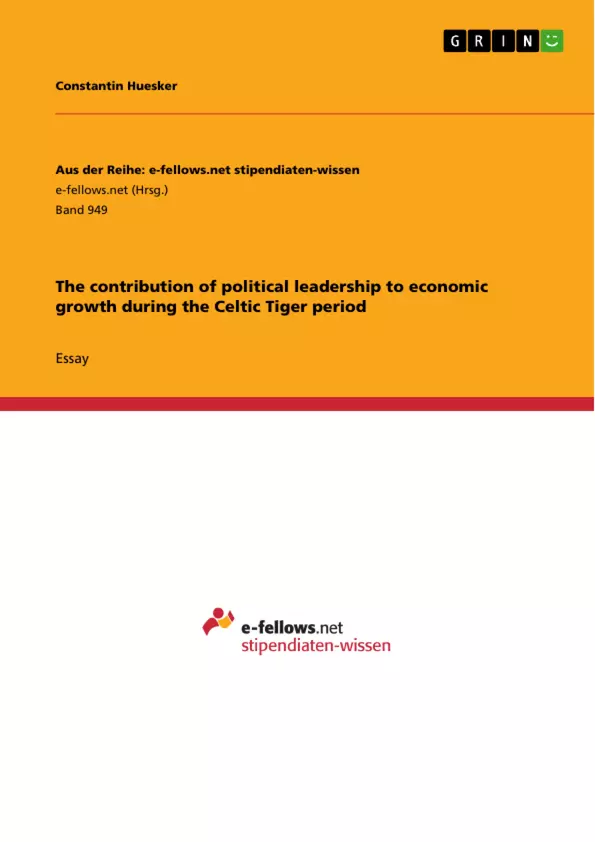In 2007 the real GDP growth rate was at 6%.
In 2007 the unemployment rate was at 4%.
In 2007 general government debts accounted for 25% of the GDP.
These are some facts on Ireland by the end of 2007. All three figures are well below the EU average and Ireland is one of the wealthiest countries worldwide. Ireland’s economic success is unprecedented in Europe. Therefore the green Island was also known as the “Celtic Tiger”.
Critics argue that Ireland’s economic success predominantly arose from external factors, such as EU grants and Foreign Direct Investment (FDI). But is this really the case? Probably not, but it was the political framework that established the favourable economic environment.
This paper analyses the impact of political leadership to the economic boom between 1990 and 2007. Since it was not a single decision that attracted foreign firms, but rather an evolving process that fuelled Ireland’s economy, the essay covers the whole period of time between the 1950s and the 2000s.
Inhaltsverzeichnis (Table of Contents)
- Introduction
- An Open Economy
- Policies in the 1960s
- Joining the European Economic Community
- Education
- Ireland's Skilled Workforce
- Fiscal Policy
- Taxation
- Social Policies
- Social Partnership
- Industrial Policies
- Public Enterprises
- Foreign Direct Investment
- Conclusion
Zielsetzung und Themenschwerpunkte (Objectives and Key Themes)
This paper examines the contribution of political leadership to Ireland's economic growth during the "Celtic Tiger" period from 1990 to 2007. It aims to assess the role of various policies implemented by Irish political leaders in creating a favorable economic environment that attracted foreign investment and fostered economic growth. The paper explores the period from the 1950s to the 2000s, highlighting the evolving process that underpinned Ireland's economic boom. Key themes include:- The transition from a closed to an open economy
- The impact of European integration on Ireland's economy
- The role of education and skills development in driving economic growth
- The significance of fiscal and social policies in fostering economic success
- The importance of industrial policies, including public enterprises and foreign direct investment
Zusammenfassung der Kapitel (Chapter Summaries)
The introduction outlines Ireland's economic success during the "Celtic Tiger" period, characterized by high growth rates, low unemployment, and low government debt. It highlights the debate surrounding the factors contributing to this success, emphasizing the role of political leadership in creating a conducive economic environment.
The chapter on "An Open Economy" explores the shift in Irish political leadership's attitude towards economic policy in the 1960s. It examines the adoption of an open-market strategy, with key events including the Anglo-Irish Trade Area Agreement and Ireland's entry into the General Agreement on Tariffs and Trade (GATT). The chapter also discusses the benefits and challenges of Ireland joining the European Economic Community (EEC), emphasizing the increased access to factors of production and markets.
The chapter on "Education" analyzes the evolution of Ireland's educational system in the 1960s, highlighting its shortcomings compared to other European countries. It then examines the measures taken to address these shortcomings and provide a skilled workforce, including the introduction of mass public-funded secondary education, the establishment of universities, and the growth of Regional Technical Colleges (RTCs). This chapter also includes data on the increasing number of graduates and the impact of investment in education on attracting multinational companies.
Schlüsselwörter (Keywords)
This paper focuses on the economic growth of Ireland during the "Celtic Tiger" period, emphasizing the contribution of political leadership. Key terms include: open economy, European integration, education, skilled workforce, fiscal policy, social policies, industrial policies, public enterprises, foreign direct investment, and economic growth.Frequently Asked Questions
What was the "Celtic Tiger" period in Ireland?
It refers to the era of rapid economic growth in Ireland between 1990 and 2007, characterized by high GDP growth and low unemployment.
How did political leadership contribute to this economic boom?
Political leaders established a favorable framework through tax incentives, investment in education, and promoting an open-market strategy.
What role did the European Union play?
Joining the EEC provided Ireland with access to larger markets and significant EU grants, which helped modernize the infrastructure and economy.
Why was education a key factor for the Celtic Tiger?
Massive investment in secondary and technical education created a highly skilled workforce, making Ireland attractive for Foreign Direct Investment (FDI).
What is "Social Partnership" in the Irish context?
It was a series of agreements between the government, employers, and trade unions to ensure wage stability and industrial peace during the growth period.
- Citar trabajo
- Constantin Huesker (Autor), 2011, The contribution of political leadership to economic growth during the Celtic Tiger period, Múnich, GRIN Verlag, https://www.grin.com/document/275950



